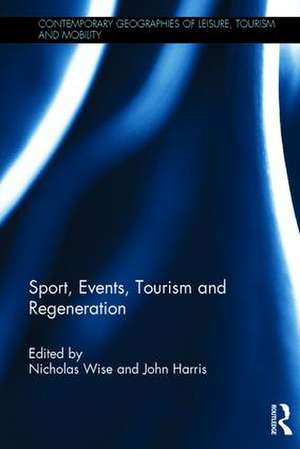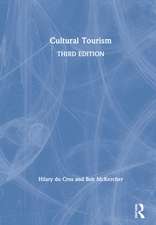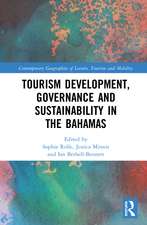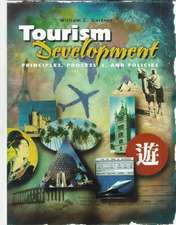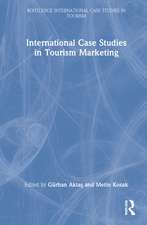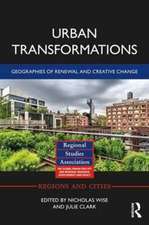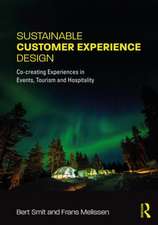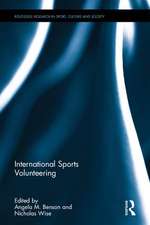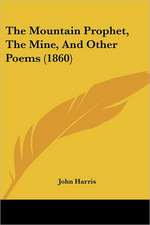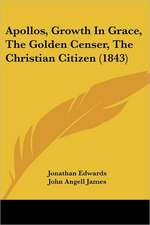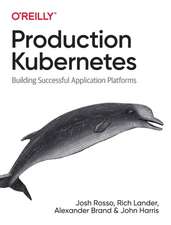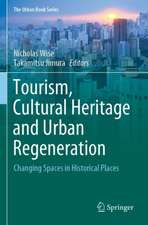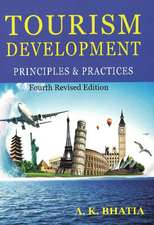Sport, Events, Tourism and Regeneration: Contemporary Geographies of Leisure, Tourism and Mobility
Editat de Nicholas Wise, John Harrisen Limba Engleză Hardback – 23 feb 2017
This book brings together a collection focusing on the diverse range of approaches and perspectives of regeneration. Twelve chapters outline and bring together critical perspectives of regeneration from scholars in different parts of the world. This collection critically assesses some of the key factors impacting upon regeneration initiatives in relation to sport, events and tourism. By doing so, this book assesses if new opportunities have arisen from developments, increasing the demands and needs of locals and tourists, or if transformations result in exclusion - thus challenging who regeneration is for.
This book will be valuable reading for students and academics interested in tourism studies, events planning, sport and leisure studies or development studies, as well as the wider social sciences.
Din seria Contemporary Geographies of Leisure, Tourism and Mobility
-
 Preț: 311.41 lei
Preț: 311.41 lei -
 Preț: 311.41 lei
Preț: 311.41 lei -
 Preț: 311.41 lei
Preț: 311.41 lei -
 Preț: 326.49 lei
Preț: 326.49 lei -
 Preț: 325.97 lei
Preț: 325.97 lei -
 Preț: 324.71 lei
Preț: 324.71 lei -
 Preț: 311.51 lei
Preț: 311.51 lei -
 Preț: 296.80 lei
Preț: 296.80 lei -
 Preț: 310.65 lei
Preț: 310.65 lei -
 Preț: 233.53 lei
Preț: 233.53 lei -
 Preț: 356.63 lei
Preț: 356.63 lei -
 Preț: 355.44 lei
Preț: 355.44 lei - 18%
 Preț: 1057.89 lei
Preț: 1057.89 lei - 18%
 Preț: 1057.40 lei
Preț: 1057.40 lei - 30%
 Preț: 850.91 lei
Preț: 850.91 lei - 18%
 Preț: 1165.73 lei
Preț: 1165.73 lei - 18%
 Preț: 1379.90 lei
Preț: 1379.90 lei - 18%
 Preț: 710.40 lei
Preț: 710.40 lei - 18%
 Preț: 1058.69 lei
Preț: 1058.69 lei - 18%
 Preț: 1222.85 lei
Preț: 1222.85 lei - 18%
 Preț: 1056.00 lei
Preț: 1056.00 lei - 18%
 Preț: 1220.63 lei
Preț: 1220.63 lei - 18%
 Preț: 1115.21 lei
Preț: 1115.21 lei - 18%
 Preț: 1056.00 lei
Preț: 1056.00 lei - 26%
 Preț: 765.43 lei
Preț: 765.43 lei - 18%
 Preț: 1055.51 lei
Preț: 1055.51 lei -
 Preț: 415.67 lei
Preț: 415.67 lei - 18%
 Preț: 1051.10 lei
Preț: 1051.10 lei -
 Preț: 416.26 lei
Preț: 416.26 lei - 18%
 Preț: 1223.21 lei
Preț: 1223.21 lei -
 Preț: 396.46 lei
Preț: 396.46 lei - 18%
 Preț: 1117.07 lei
Preț: 1117.07 lei - 18%
 Preț: 1056.35 lei
Preț: 1056.35 lei - 18%
 Preț: 1127.34 lei
Preț: 1127.34 lei - 18%
 Preț: 1062.47 lei
Preț: 1062.47 lei - 26%
 Preț: 822.54 lei
Preț: 822.54 lei - 18%
 Preț: 1119.16 lei
Preț: 1119.16 lei - 18%
 Preț: 1060.74 lei
Preț: 1060.74 lei - 26%
 Preț: 990.17 lei
Preț: 990.17 lei - 28%
 Preț: 848.98 lei
Preț: 848.98 lei - 18%
 Preț: 1336.32 lei
Preț: 1336.32 lei -
 Preț: 488.33 lei
Preț: 488.33 lei - 18%
 Preț: 1395.61 lei
Preț: 1395.61 lei - 26%
 Preț: 822.54 lei
Preț: 822.54 lei - 18%
 Preț: 1066.09 lei
Preț: 1066.09 lei
Preț: 875.55 lei
Preț vechi: 1215.81 lei
-28% Nou
Puncte Express: 1313
Preț estimativ în valută:
167.54€ • 175.28$ • 139.17£
167.54€ • 175.28$ • 139.17£
Carte tipărită la comandă
Livrare economică 03-17 aprilie
Preluare comenzi: 021 569.72.76
Specificații
ISBN-13: 9781138642812
ISBN-10: 1138642819
Pagini: 216
Ilustrații: 24
Dimensiuni: 156 x 234 x 17 mm
Greutate: 0.45 kg
Ediția:1
Editura: Taylor & Francis
Colecția Routledge
Seria Contemporary Geographies of Leisure, Tourism and Mobility
Locul publicării:Oxford, United Kingdom
ISBN-10: 1138642819
Pagini: 216
Ilustrații: 24
Dimensiuni: 156 x 234 x 17 mm
Greutate: 0.45 kg
Ediția:1
Editura: Taylor & Francis
Colecția Routledge
Seria Contemporary Geographies of Leisure, Tourism and Mobility
Locul publicării:Oxford, United Kingdom
Public țintă
PostgraduateCuprins
Introduction: Framing sport, events, tourism and regeneration
Nicholas Wise and John Harris
1. Sports events, tourism, development and regeneration: A perspective from Gulf States of Abu Dhabi, Dubai and Qatar
Joan Henderson
2. Transforming Brazil: Sporting mega-events, tourism, geography and the need for sustainable regeneration in host cities
Nicholas Wise and Gareth Hall
3. Durban’s FIFA 2010 beachfront ‘beautification’
Brij Maharaj
4. Mega-event scepticism in South Korea: Lessons from the 2014 Incheon Asian Games
Jung Woo Lee
5. A City beyond the nation: Sport, tourism and events in the remaking of Cardiff
John Harris
6. Using the Event-Scorecard and the Event Management System as powerful strategic tools for destinations, examples from Switzerland
Jürg Stettler, Christine Herzer, Anna Wallebohr and Heinz Rütter
7. Sports and event-led regeneration strategies in post-earthquake Christchurch
Alberto Amore and C. Michael Hall
8. Urban coalitions and the production of Atlanta’s downtown
Costas Spirou, Candace Miller and Brandi Baker
9. Events within Asia’s Integrated Resorts
Glenn McCartney
10. Urban elements that facilitate sport and physical activity in regenerated public spaces: Barcelona’s waterfront
Sacra Morejon, Sixte Abadía and Xavier Pujadas
11. Economic effects of sports development strategies: Regeneration to support urban event and tourism strategies in five cities across the United States
Sangkwon Lee
12. The role of sports tourism and events to regenerate and sustain off-season tourism in Istria, Croatia: Addressing perspectives from industry managers and planners
Nicholas Wise, Marko Perić and Tanja Armenski
Conclusion: Future directions in the (re)generation game
John Harris and Nicholas Wise
Nicholas Wise and John Harris
1. Sports events, tourism, development and regeneration: A perspective from Gulf States of Abu Dhabi, Dubai and Qatar
Joan Henderson
2. Transforming Brazil: Sporting mega-events, tourism, geography and the need for sustainable regeneration in host cities
Nicholas Wise and Gareth Hall
3. Durban’s FIFA 2010 beachfront ‘beautification’
Brij Maharaj
4. Mega-event scepticism in South Korea: Lessons from the 2014 Incheon Asian Games
Jung Woo Lee
5. A City beyond the nation: Sport, tourism and events in the remaking of Cardiff
John Harris
6. Using the Event-Scorecard and the Event Management System as powerful strategic tools for destinations, examples from Switzerland
Jürg Stettler, Christine Herzer, Anna Wallebohr and Heinz Rütter
7. Sports and event-led regeneration strategies in post-earthquake Christchurch
Alberto Amore and C. Michael Hall
8. Urban coalitions and the production of Atlanta’s downtown
Costas Spirou, Candace Miller and Brandi Baker
9. Events within Asia’s Integrated Resorts
Glenn McCartney
10. Urban elements that facilitate sport and physical activity in regenerated public spaces: Barcelona’s waterfront
Sacra Morejon, Sixte Abadía and Xavier Pujadas
11. Economic effects of sports development strategies: Regeneration to support urban event and tourism strategies in five cities across the United States
Sangkwon Lee
12. The role of sports tourism and events to regenerate and sustain off-season tourism in Istria, Croatia: Addressing perspectives from industry managers and planners
Nicholas Wise, Marko Perić and Tanja Armenski
Conclusion: Future directions in the (re)generation game
John Harris and Nicholas Wise
Descriere
This book brings together critical perspectives of regeneration with a particular focus that reflects on the interconnectedness of events, sport and tourism studies from scholars in different parts of the world. By doing so this book assesses if new opportunities have arisen from developments, increasing the demands and needs of locals and tourists, or if transformations result in exclusion among locals—thus challenging who regeneration is for. This collection considers management agendas, economic development strategy and social impacts to suggest new directions in policy and intended legacies.
